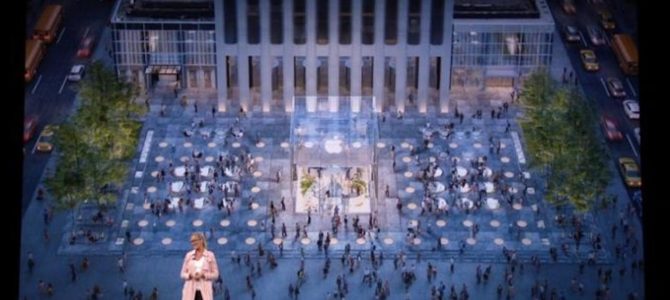
What is a store for? Its definition appears to be changing, increasingly illusory, as consumers embrace digitalization and the virtual.
For many, running to the grocery store is replaced by ordering groceries on Amazon Fresh. While trips to the shopping mall are still relatively popular, depending on where one lives, many malls are now ghosts of themselves: empty holes of space, surrounded by a mass of unused parking lot.
As the world increasingly turns to computers for an easy shopping alternative, retail stores are attempting to reinvent themselves: to assert their usefulness and relevance in a digitalized economy. But many seem to be finding their answer to this dilemma not by burying into retail practices of the last several decades, but rather by reinventing their stores’ experience entirely. Take Nordstrom, for example.
A Nordstrom With No Clothes
Nordstrom just announced their creation of a “store” without merchandise last week: a 3,000-square-foot space called “Nordstrom Local” which would offer experiential amenities, such as a spa and a bar, hair salon and tailor.
“Stylists will be on hand to guide shoppers to a personalized wardrobe, which customers can then order online to be delivered to the store that same day,” reports the Washington Post. “Or the stylists will visit one of the nine local traditional Nordstrom locations to retrieve the purchase. The idea is to keep shoppers from feeling overwhelmed by too much choice.”
It’s a fascinating idea, especially at a time when online retail stores offer a mind-numbing array of choices. We have more options than ever before—but that doesn’t mean shoppers are happier than ever before. We still have to return clothes that don’t fit, don’t work, or don’t look like they were advertised. As people experience information overload online, they increasingly turn to expert curators—via newsletters, podcasts, and blogs—to give them the most important information of the day. Maybe this is what shoppers want, too.
“Retailers are, very consciously, promoting these in-store ‘experiences,’” Joe Pinsker writes for The Atlantic. “… It’s a reaction to the fact that buying is now something that can be done anywhere, and that reaction can be detected in a linguistic shift.”
When A Store Becomes A ‘Town Square’
Meanwhile, Apple announced on Wednesday that their newest store will not be called a store, but rather a “town square,” boasting “avenues” instead of aisles. The stores will offer space for more than just buying, encouraging customers to participate in classes on topics such as coding, music, and photography.
But there’s a problem with labeling a store a “town square,” as Alexis Madrigal notes: one is a public space, and one is not. Like Facebook, Apple enjoys marketing itself as a community-fostering entity. The company adopts the trappings and language of a rather pleasant Big Brother. We forget that these are for-profit companies, with their own interests at heart.
“In adopting the faux democratic language of Facebook and Twitter,” Madrigal writes, “Apple has made the perfect physical metaphor for the largely ineffable problem the internet poses to democracy. Maybe that will make people realize how absurd it is to expect fundamentally commercial entities to build community or to serve liberal democracy or to make your voice heard or to act as an agora or whatever else.”
Apple Asserts Its Dominance In the Public Space
Private businesses like Apple are asserting their dominance in a space once filled by public and private associations such as libraries, churches, and city halls. In a society of religious “nones,” where millennials are more likely to spend their Sunday mornings at brunch instead of in church pews, how do public spaces shift as a result? What becomes our new church, our new library?
Apple seems to be answering: we are. And such a claim would make sense—few other companies foster the sort of widespread reverence and adulation that Apple does. Few are as publicly ubiquitous. Apple products are our talismans of success and wokeness. They’re more publicly ubiquitous than books or crosses—indeed, these days, with widespread book and Bible apps, they’re often functioning as a digital representation of both.
But if retail stores take over and reinvent the town square, what does that mean for the future of public versus private space? What does it mean for the day-to-day functioning of community?
What Stores Might Follow Suit?
Silicon Valley has increasingly fostered its own villages of private association: Google has its Googleplex, replete with gyms, electric cars, volleyball courts, and a fleet of food trucks. Facebook intends to create its own “mixed-use” village in Menlo Park, California over the next few years. Ironically, the companies that increasingly draw us to virtual realities are reinventing physical space, as well.
Thus, one potential outworking of Apple’s “town square” ideal would be the profusion of these Silicon Valley bubbles around the United States and world. If Apple starts building town squares, it’s plausible to assume that companies like Amazon and Google might endeavor to follow suit, offering Googleplex theme parks and Amazon open-air markets, say.
Another, more likely possibility is that stores increasingly adopt the idea of experiential “shopping,” but individualize it according to their brand, like Nordstrom: offering experiential enclaves that are connected to the digital but proffer “real” services. Some stores are already leaning this direction: Anthropologie and West Elm host workshops and themed dinners, and Sur La Table houses industrial kitchens for cooking classes and events.
One thing is for sure: these companies are nothing if not ambitious. And they are endeavoring to assert the importance of their physical spaces, even as digital devices threaten to take over the retail world. Many of us still enjoy physical, tactile shopping—so there will always be a market for such stores. The question is whether we’ll like the versions of shopping these companies decide to give us.








